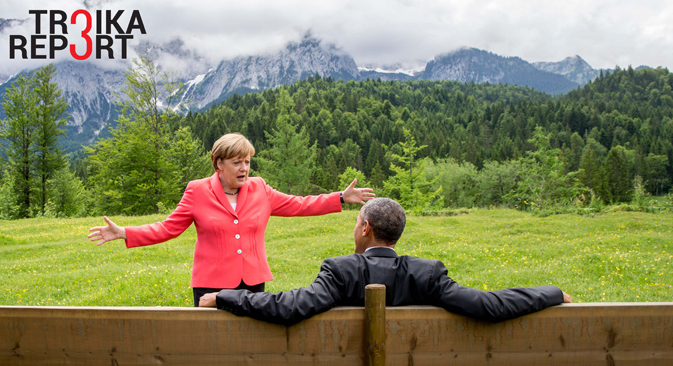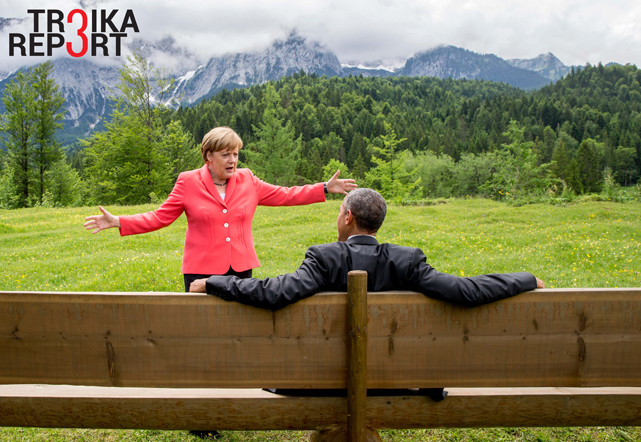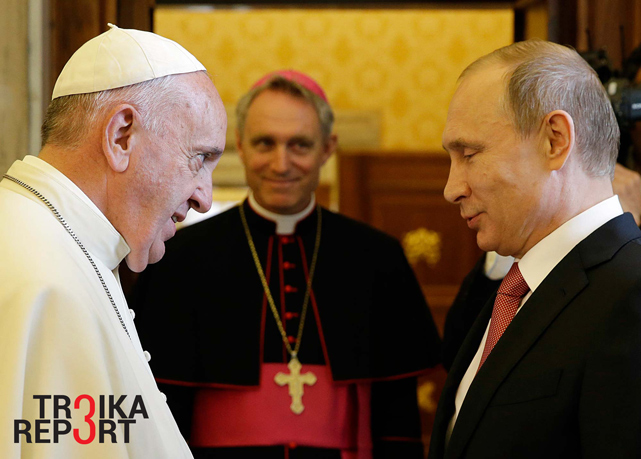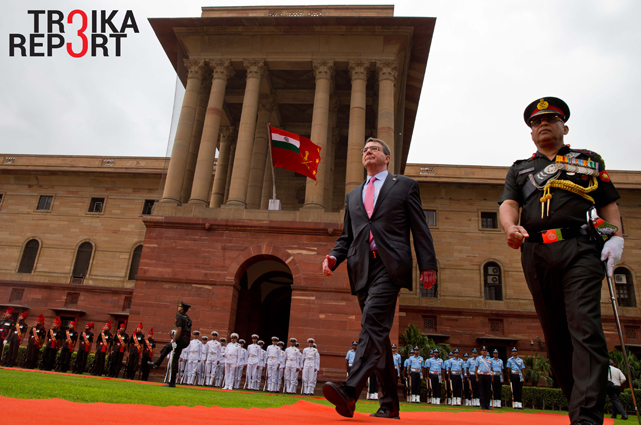G7 stands firm on Russia; Italy welcomes dialogue with Putin; Pentagon chief rallies India behind U.S. policy

1. Engaging the West
G7 leaves the door open for Russia – but on strict conditions

German Chancellor Angela Merkel speaks with U.S. President Barack Obama outside the Elmau castle in Kruen near Garmisch-Partenkirchen, Germany, June 8, 2015. Source: Reuters
This week’s G7 summit in the Bavarian Alps was a watershed, marking the lowest point in more than 20 years of up-and-down relations with Russia. The unprecedented call by the grouping to punish Moscow unless it deviates from its current course represents the culmination of a dramatic reversal of the previous policy of engaging Russia from the times of perestroika under Gorbachev and later under Yeltsin.
However, the G7 left the door open by stating that Russia could be reaccepted into the group, thereby restoring the G8, if Moscow observed its commitments regarding the crisis in Ukraine.
Since relations between Russia and the West entered the deep freeze, the issue has become emotionally and politically loaded. In today’s Troika Report on “Engaging the West,” two prominent former diplomats who were intimately involved in the early 1990s with Russia’s accession to the G8, locked horns over what is at stake and who is the culprit.
Georgy Kunadze, now a senior fellow of the Moscow-based Institute of World Economy and International Relations, contributed to Russia joining the G7 in his former capacity as deputy Minister of Foreign Affairs. Troika Report asked Kunadze: Have the relations between the G7 and Russia reached the point of no return? Or is there a way back for Moscow? And if this is the case, then on what terms and conditions? Kunadze, a known critic of the Kremlin, had this to say:
“If I have to choose between the points you made, I would rather subscribe to the former. Under the present circumstances, Russia has already passed the point of no return. In a recent interview with Italian journalists, President Putin emphasized that he believed he has done everything right. What he has done was exactly what led to the ejection of Russia from the G8. I do not see any room for compromise unless President Putin is ready to admit some wrongdoings on the part of Russia. Or the G7 will tacitly admit that ‘this is the way it is’ and the ‘show must go on.’ I do not see any chance, for the moment at least, for Russia or the G7 member states to take a step back from their present positions.
“We should be candid it spelling out the differences between G7 and Russia. Russia has been expelled from G7 for the annexation of Crimea and the semi-official war it launched in eastern Ukraine which is going on for one year already. I do not see any chance of G7 being ready to swallow this.”
— Do you think the G7 and Russia need each other, and is there anything that they should come together and discuss?
“We live in one and the same world, and Russia in any condition, political shape and frame of its collective mind is still a big factor. Due to this reason, the G7 will keep talking to Russia, but in a somewhat different format. Russian needs the G7 countries because they are not only democratic countries but also leaders in global politics, economy and finances. The dialogue will go on but not in the G8 format.”
— You personally made a lot of effort for Russia to join the G7. What are your feelings today when your efforts have been nullified by the ghost of the Cold War?
“This would be an understatement if I say that I am not happy with that. When Russia was admitted to the G7, it could not realistically qualify to be a member of this league. Since then it has been an uphill battle for Russia to catch up with the leading democracies not only in terms of its GDP size but in the way Russia perceives itself in the world of politics, economics and human rights. Back in the mid-1990s it looked like Russia would be able to catch up, but later the gap widened. Now this gap is appalling in many ways.”
Is this really the end of the short-lived romance between G7 and Russia? Should the people of Russia view the gap between the two entities as “appalling,” to quote Georgy Kunadze? A rather different opinion was expressed to Troika Report by Fyodor Shelov-Kovedyayev, an academic and former First Deputy Foreign Minister of Russia, who also was instrumental in Russia’s westernization in the mid-1990s. Here is what he said:
“It is clear that it is better to talk than to quarrel. Yet, if the game is over, then we shall have to live separately. Now we are witnessing a war of nerves, and the West is losing this war. After the collapse of the Soviet Union, the West arrogantly assumed that it won the Cold War, mostly due to techniques of information and psychological warfare. Today, the West is attempting to duplicate what it believed was its success story, and instigate the Russian public into sedition and revolt in order to change Moscow’s foreign policy and, hopefully, its leadership.
“This kind of outside pressure is not working. It would never work in Russia given the legacy of its history. The paradox, as viewed from the West, amounts to the end result being quite the opposite: Under outside pressure, the Russian public is now more consolidated around its leaders. The G7 summit has involuntarily reflected, to some extent, a rather nervous reaction to these developments.”
This divergence in the opinions of two high-ranking diplomats from the Boris Yeltsin era demonstrates the crucial value of the former G8 grouping, which served as a platform of convergence on a range of issues. Today, with the de facto divorce, Russia is once again being pushed eastward to embrace new alliances.
2. Globally Speaking
Rome and Vatican welcome dialogue with Putin

Pope Francis meets Russian President Vladimir Putin on the occasion of a private audience at the Vatican, June 10, 2015. Source: AP/Gregorio Borgia, Pool
Just days after this week’s G7 summit in Bavaria, which took a tough line on Moscow, Russian President Vladimir Putin paid a visit to Italy, conversed with its leadership and tested common ground with the head of the Roman Catholic Church, Pope Francis.
Although the meetings in Rome did not produce any concrete results, their symbolic meaning sent a message: The line between Europe and Russia is not fully disconnected.
How does this week’s meeting with the Pope fit into Russia’s foreign policy priorities? Fyodor Shelov-Kovedyayev, an academic and former First Deputy Foreign Minister of Russia, made the following comment for Troika Report:
“Pope Francis is the spiritual leader of more than one billion Catholics around the world. In some of his public messages he has expressed deep concern over the animosity which occasionally rears its head, and in particular, through the crisis in relations between Russia and the West over the developments in Ukraine.”
It should be put on record that Pope Francis did not uphold calls from the Ukrainian Catholic Church to condemn Russia over the allegations that Moscow is fanning tensions and engaged in low-intensity conflict in Eastern Ukraine. Instead, the Holy See has called on all parties involved to cease hostilities.
— Italy is the second country in Europe that President Putin visited this year (after Hungary) of the EU. What is so special about Italy?
“Italy has been pursuing a moderate policy with regard to Russia. It is worth remembering the call by the Italian foreign minister for Russia to be given guarantees that Ukraine would never be offered NATO member status. By going to Rome, Vladimir Putin is sending an unequivocal signal: Russia does not revoke bi-lateral contacts. Russia is not offended and is eager to show the patience and tolerance that is so popular in Western Europe. Moscow also is well aware of the limitations faced by certain European countries in their dialogue with Russia.”
Could this be one of the reasons why Moscow is so willing to interact with the Vatican?
Father Yanes Sever, a priest from the Moscow-based Society of Jesus, sounded very positive about the meeting between Putin and the pontiff:
“The meeting between the Pope and President Putin is very encouraging. It is one channel of dialogue that needs to stay open. It is good that it is possible. This can have an effect on the overall situation in the world, since Pope Francis meets with all leaders and can pass on to others the concerns of all sides. The true way to peace and justice is through dialogue, and through channels that remain open. As soon as the channels are closed, things go into misunderstandings and means which are much more violent.”
— Would it be fair to assume that the Catholic Church is taking a more proactive stance in global affairs, especially in the light of the frequent failure of mainstream diplomacy to bring positive results?
“The Catholic Church, especially in the last few centuries, has always played a very important global role. A recent example is the renewal of the relationship between the United States and Cuba. This is a case when Pope Francis, and probably Pope Benedict, were involved in making this happen, encouraging it and finally coming to a concrete result.
“It is important that Catholic Church, which has about 1.3 billion followers around the world, remains well connected with what the world is living through. The Pope has just returned from Sarajevo: He brought the message of peace and unity to a place where there was much division. The Church is ready to facilitate changes for the better.”
In summary, Rome seems to be the logical destination for Vladimir Putin. First, Italy, one of the G7 nations, is as flexible in its approach to Russia as Austria, Greece, Hungary and Cyprus. Italy is one of Russia’s major trading partners and has been complaining that the war of sanctions in hurting its business.
Second, the meeting in the Vatican was motivated also by the invisible bond between Pope Francis and Putin. Both are committed to preserving conservative values rooted in European traditions, born out of Christian moral principles.
Putin’s visit to Italy serves as yet another proof: It’s better to be on speaking terms than to turn your back.
3. Going Eastward
Pentagon chief rallies Asia behind U.S. foreign policy

U.S. Defense Secretary Ashton Carter inspects a Guard of Honor during his ceremonial welcome in New Delhi, India, Wednesday, June 3, 2015. Source: AP
The recent visit to New Delhi by U.S. Secretary of Defense Ashton Carter highlighted the tense – and tougher – competition that Russian arms manufacturers are facing on the lucrative Indian market. The upgrade in the strategic relationship between India and the U.S. has an inevitable political agenda attached. China, a close ally of Russia, is often referred to in Washington as the root cause for assisting Delhi in its armaments build-up and in broadening U.S.-India military cooperation.
In fact, India was part of a marathon trip to the Asia-Pacific region by the American defense secretary. Earlier, at the Shangri-La Dialogue conference in Singapore, attended by defense ministers of 26 nations of the region, Carter criticized China for its latest island reclamation in disputed waters in the South China Sea, and later in Vietnam signed the first-ever statement facilitating deeper military cooperation between the two former enemies. New Delhi was the climax of the trip.
Russia has been the traditional partner of choice for India in terms of arms procurement and weapons development and co-production. Now, the realities on the ground have changed: the United States has enhanced its foothold in arms sales in India in a matter of just 10 years, challenging Russian supremacy.
For the moment, the U.S. has recorded a $13 billion backlog of defense orders from India as of 2015, while Russia’s portfolio weighs only $10 billion.
Carter’s visit culminated with the signing of the 2015 U.S.-India Defense Framework, an extension of the agreement, which had expired after 10 years. The new deal incorporates the Defense Technology and Trade Initiative (DTTI), allowing to test ground for joint production of weapons. Earlier this year, the two sides explored options for the co-production of next-generation Raven unmanned aerial vehicles, protective gear against chemical and biological weapons, as well as jet engines and, on top of all, aircraft carrier design.
The extension of the defense cooperation agreement with India marks a new stage in the U.S. policy of “rebalancing” toward the Asia-Pacific region. As part of this strategy, was the U.S. secretary of defense aiming to push China and Russia to the peripheries in their relations with India? This assumption has been downplayed by Indian defense expert Nandan Unnikrishnan, vice-president of the Observer Research Foundation, who made the following comment to Troika Report:
“I do not think Mr. Carter came to India with the mission of deterring China or sidelining Russia.”
“There is continuous tension in relations between the United States and Russia and, understandably, with China. It is linked to a variety of issues, the situation in the South China Sea and in Ukraine. I think Mr Carter was very clear when he spoke in Shangri-La. This is part of what is called in the United States the “re-balance” towards Asia. Mr Carter’s mission is consistent with the policy announced by Barack Obama a couple of years ago. So I do not think there was anything new about Mr Carter’s visit to Asia.”
— There is much talk about the U.S. trying to cut corners to overtake Russia as the purveyor of military hardware to India. Will Russia, consequentially, face a stiffer competition from U.S. arms producers and exporters?
“There are a few things you should keep in mind. America is not only looking at India as a market for its arms. America is trying to build a long-term strategic partnership with India. To form sort of a loose alliance with countries which think similarly. Arms trade would be only a part of this strategic partnership… The defence agreement has now been extended for another 10 years, which basically places the relations between India and the United States at a strategic level. If taken on a year-on-year basis, the U.S. has already overtaken Russia in terms of arms supplies. For the last three years, the U.S. is the biggest arms supplier, Israel is second and Russian is third.”
“I would not reduce India-Russian relations to just the arms market, but I think Russia should not take India for granted. Russia would have to make an extra effort to keep India as a good friend.”
While preserving meaningful and friendly relations with India is not “mission impossible” for Russia, it is a much more challenging task for China. The United States makes no great secret of its desire to encourage India to invite Japan to participate in Malabar, an annual Indo-U.S. bilateral naval exercise. The idea is to create, according to U.S. officials, “a tri-lateral India-U.S.-Japan grouping.”
This is almost certain to irritate Beijing, which back in 2007 qualified a joint exercise by Japan, Australia and Singapore as an “anti-China” enterprise. The explanation of the need of a military build-up for India was given by Ben Moores, a defense and security expert at IHS, in plain English: “India requires more capable equipment to deal with an aggressive and increasingly capable China.”
However, this rationale nonetheless contradicts the letter and spirit of the recent visit by Indian Prime Minister Narendra Modi to China, and the intention of his government to join the Beijing-led and Moscow-supported Shanghai Cooperation Organization.
Read more: ‘We need to find a way out’ of sanctions, says Putin on visit to Rome>>>
All rights reserved by Rossiyskaya Gazeta.
Subscribe
to our newsletter!
Get the week's best stories straight to your inbox